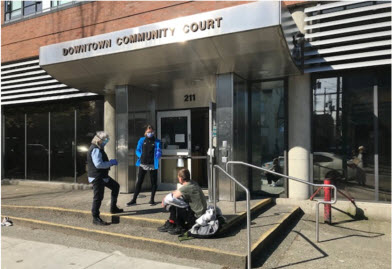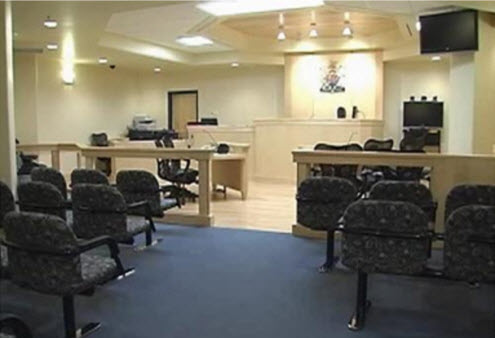Location: Vancouver, BC
First sitting: December 10, 2008
Contact to participate: If you want to plead guilty and are ready to work with the Downtown Community Court teams, speak to your lawyer or Duty counsel about whether you qualify for Downtown Community Court. They can speak to the prosecutor for you.
Specialized Work
- Many offenders in downtown Vancouver have health and social issues that include alcoholism, drug addiction, mental illness, homelessness, and poverty. Downtown Community Court (DCC) is not a trial court. It is a criminal bail and sentencing court in which integrated teams of professionals help some of these offenders get the treatment and support they require.
- Teams include the DCC coordinator, prosecutor (called Crown counsel) and defence lawyers, police officers, sheriffs, court clerks, probation officers, Native Courtworkers, a psychiatrist, and other health and social service agencies located in or near the Court.
- DCC also relies on relationships with residents and businesses in the community to create unique solutions to complex problems.

Operation
- DCC has a courtroom, offices, and meeting and program space in a renovated building at 211 Gore Avenue in Vancouver’s Downtown Eastside.
- Judges are assigned to DCC for several years to provide continuity.
- Prosecutors are also assigned to DCC for extended periods. They screen people who ask to plead guilty in DCC.
- Judges often place DCC participants (called “clients”) on bail orders or sentences with intensive supervision and conditions designed to address the underlying causes of their criminal behaviour. However, the judge may impose a jail sentence.
- A Case Management Team offers intensive “hands on” help to the most vulnerable clients. A Mental Health Team provides supervision with early intervention for people needing it. For example, these teams offer clients needing addiction treatment help with housing, mental and physical health care, Indigenous supports, income assistance, and access to other programs.
- Offenders repay the community through community service in DCC’s Alternative Measures Program.

DCC courtroom
Development
- In 2005 a Street Crimes Working Group including judges, lawyers, police, Community Corrections, Forensic Psychiatric Services, Vancouver Coastal Health and the Ministry of Children and Family Development was created in Vancouver. Its goal was to find better ways to respond to chronic, low level offenders and the “revolving door” sometimes seen in the court system. It recommended establishment of a community-based court with “wrap around” services in Vancouver’s Downtown Eastside.
- The BC Provincial Court then worked with the provincial government, social and health service agencies, and the community to create Canada’s first community court.
Goals
DCC’s goals include reducing crime and improving public safety by:
- providing sanctions, interventions, and integrated justice, health, and social services to offenders in a timely manner
- fostering a sense of responsibility in offenders and holding them accountable for their actions
DCC has been evaluated twice. Evaluations (see links below) have shown a significant decrease in re-offending for offenders who engage in DCC’s integrated Case Management and Mental Health Programs. They have also shown significant improvement in clients’ housing and attachment to community services.
Community partners /strong>
- DCC depends on partnerships. It works in collaboration with more than a dozen outside agencies including community-based non-profits.
- DCC has forged new co-operative relationships, both within the justice system and with health and social service agencies, community organizations, area residents, merchants, the faith community, and schools.
More information
- Celebrating the 10th anniversary of Vancouver’s Downtown Community Court (eNews)
- The Provincial Court and the Community in Vancouver’s Downtown Eastside (eNews)
- Judge Burgess interviewed on DCC – CBC Early Edition Jan 2016
- Report from the DCC Executive Board on the Final Evaluation of the Downtown Community Court (2013)
- Examining the Impact of Case Management in Vancouver’s Downtown Community Court (2014)
- Downtown Community Court in Vancouver: Efficiency Analysis (2013)
- Compilation of Research on the Vancouver Downtown Community Court 2008 to 2012
- Vancouver Downtown Community Court, BC Ministry of Justice
- Downtown Community Court videos, Justice Education Society

